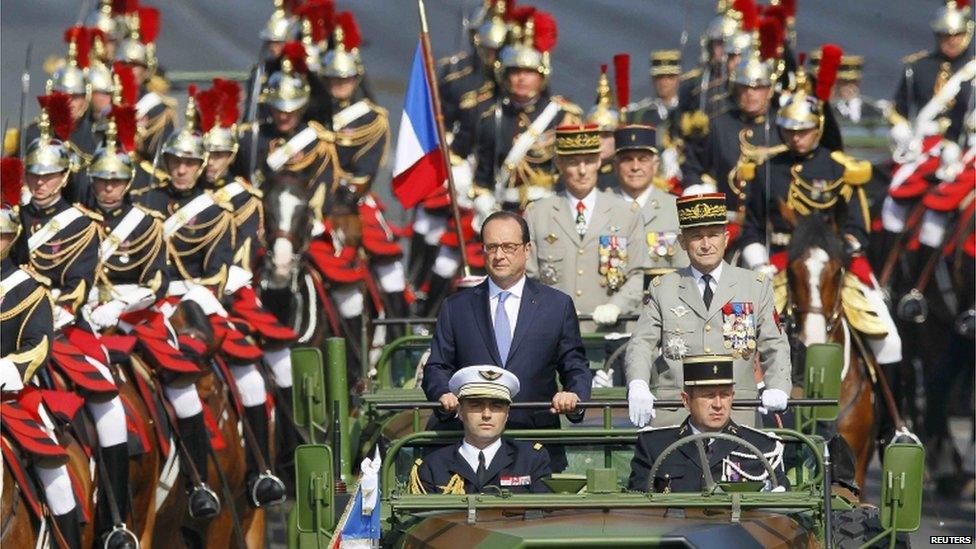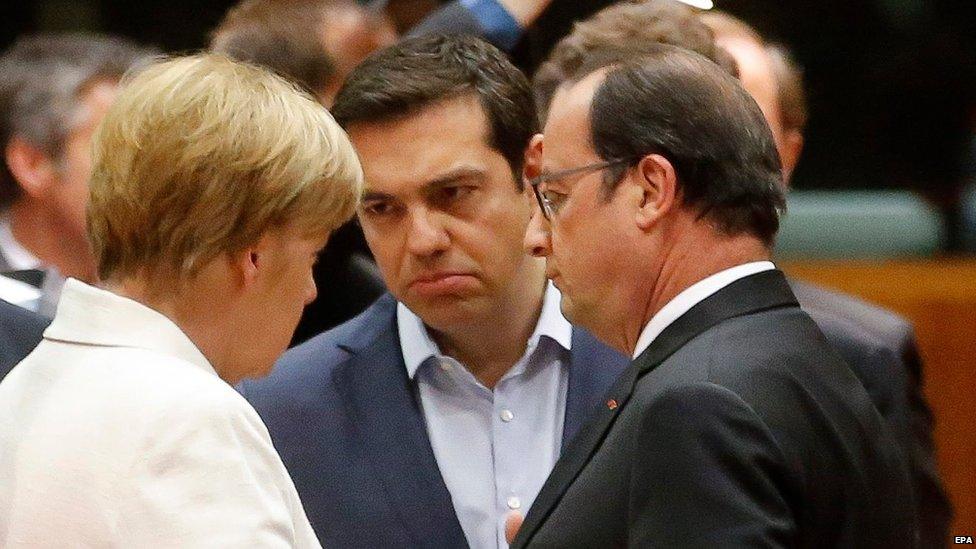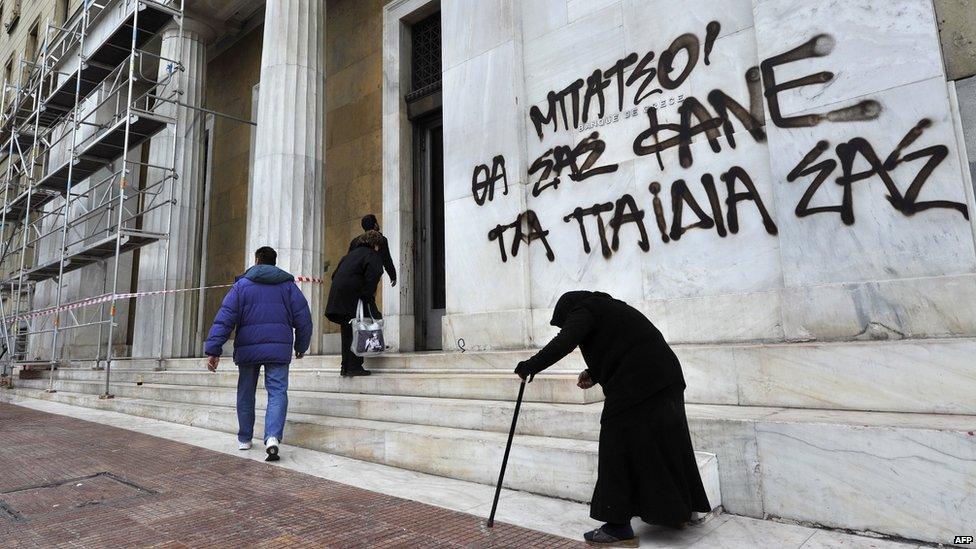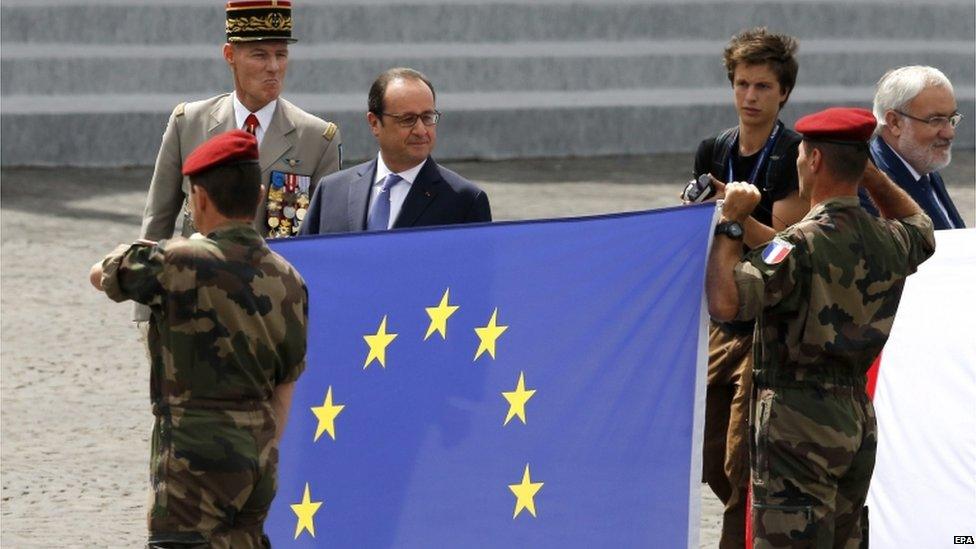Greece crisis: France's Hollande buoyed by Brussels deal
- Published

One Paris newspaper ran a Bastille Day headline "Celebration day for Hollande"
If there's one thing the French Revolution taught Europe, it is that a heavy-handed approach to an impoverished nation can be dangerous.
France remembered that lesson on Tuesday as it celebrated Bastille Day - the anniversary of the storming of that notorious Paris prison 226 years ago, marking the start of a revolution against the elite.
And alongside celebration of France's historic past is a widespread sense of pride that its president, Francois Hollande, helped secure a Greek deal with its eurozone creditors.
Greece has a fondness for its own revolutionary history: its struggle for independence from the Ottoman Empire in the early 19th Century lasted more than a decade.
It was a sentiment that former Belgian Prime Minister Guy Verhofstadt played on when he address his Greek counterpart in the European Parliament last week.
"Do you want to be remembered as an electoral accident?" he asked Alexis Tsipras, "Or a revolutionary reformer?"
President Hollande probably can't remember the last time he was called a revolutionary.
But his role at the heart of those dark and stormy crisis talks was clear. Photographs from the discussions show Mr Hollande and Germany's Angela Merkel huddled with Mr Tsipras, their faces a barometer of the tense triangular deadlock they were grappling with.

With the German chancellor beholden to rising anger at home over Greek debt, and with a German plan for a "Grexit" - or Greek departure from the eurozone - already circulating among representatives, it was the French president who seemingly smoothed the waters and found a compromise.
And after living through the worst opinion poll ratings of any modern French leader, he'll probably be content with the labels currently being bestowed on him by members of his Socialist Party.
'Piece of history'
There have been hymns of praise for his "political skill" and "tenacity". Many credit him with single-handedly keeping Greece in the eurozone.
"There are times when very few people hold in their hands a piece of history. Today Francois Hollande is one of them," the former Housing Minister, Cecile Duflot, was quoted as saying, external on Sunday night.
But then, as French journal Le Point points out, external, perhaps Mr Hollande's own party had forgotten just how good a negotiator he is.
His role in the Socialist Party, until he won the presidency, had been one of diplomat and technocrat - a skilled bringer-together of the fractious Socialist factions.
These are skills he was derided for as leader, but which allow him to shine in tight corners like the one the European Union found itself in last weekend.
That there was political mileage for Mr Hollande in refusing to give up on Greece is clear, as his critics on both the far left and the right point out.
His party is ideologically sympathetic to Greece's left-wing Syriza, brought to power on a protest vote against budget cuts.

Austerity has been a target for both the French and Greek governments
And, of course, France has itself sometimes played fast and loose with EU rules on fiscal discipline itself.
But just as important in this battle may have been the display of France's weight in Europe.
German power - both economic and political - is a reality, but Berlin's vision is frequently different to the view here in Paris, and keeping the balance at the heart of the EU has not always been easy for the French leadership.
Trouble ahead?
The leader of France's far-left bloc, Jean-Luc Melenchon, spoke of his sadness at the result of Sunday's talks, with a reference to the "brutality and omnipotence of the German government".

French sources have denied that the government might consider offering Greece a bilateral loan
For now the critical voices ranged against Mr Hollande are relatively few, but will that change if France is forced to help bankroll Greece in the coming weeks?
Athens needs immediate help to avoid a banking collapse, while negotiations begin on a third bailout agreement.
And EU finance ministers have been looking at where a bridging loan might come from.
The European Commission wants to use joint EU money, although the UK has ruled that out and other non-eurozone governments also have concerns.
Talk of bilateral loans from individual eurozone countries is resurfacing again, although French sources have denied that is an option.
However, President Hollande should enjoy the celebrations now, because the price of keeping Greece in the euro may still prove higher than anyone wants to imagine.